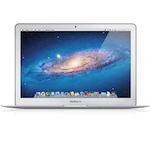
Steve Jobs, the late Apple chief executive, famously claimed that his company did not know how to make a $500 mobile computer that was not a “piece of junk.” That was in 2008, when cheap, mini-laptops called netbooks were all the rage and Apple took heat for not having a competitor.
Today, Windows PC makers are trying to use price to grab market share from Apple. The target is Apple’s MacBook Air, which today accounts for 89 percent of light-and-thin laptops – an emerging category Intel calls “ultrabooks” – according to International Strategy & Investment Group.
Ultrabooks entering the market today from vendors Acer, Asus, Toshiba, Lenovo, LG and Hewlett-Packard are going head-to-head against the basic Air, which costs $1,000 (fully tricked-out models cost almost $1,800). For Windows PC buyers used to spending less than $400 for a basic laptop, current ultrabook prices of between $900 and $1,000 are way too high.
That gap will narrow by the fourth quarter, when ultrabook pricing is expected to fall to $700. So, should Apple worry? Hardly.
As Jobs said in pooh-poohing netbooks, “There are some customers which we chose not to serve.” And those customers are the ones looking for the most basic laptop at a rock-bottom price.
What You Get for $700
Which is exactly what they will get for $700, according research firm IHS iSuppli, which does tear-down analysis for consumer electronics. First, those discount ultrabooks will rely on older microprocessors. Higher-end systems will get Intel’s Ivy Bridge processor, a 22-nanometer chip that could ship as early as this month. People who can afford only $700 will have to wait until next year for an Ivy Bridge system, after Intel releases the chip’s successor, codenamed Haswell.
More compromises will come in display, storage and memory. Cheap ultrabook screens will stay stuck at 1366 x 768, compared to the 13-inch MacBook Air’s 1440 x 900. Perhaps most significantly, storage will likely be handled by a conventional 2.5-inch hard drive instead of the pricier solid-state drives that make using a high-end ultrabook such a fast, seamless experience. Memory capacity will also be less: 2 GB versus 4 GB in higher-end systems.
Also, by the end of the year, high-end ultrabooks (including the Air) are expected to begin using touchscreens. You won’t see that in a $700 ultrabook. In addition, entry-level ultrabooks will likely have standard Wi-Fi with 4G wireless connections saved for the more expensive models.
Apple’s unibody chassis, which is cut from a single piece of aluminum, is also expected to be a differentiator – at least until the fourth quarter. That’s because Apple currently consumes most of the global manufacturing capacity for these kinds of cases, and it’s going to take time for case manufacturers to be able to accommodate other computer makers. In the meantime, competitors will have to settle for a plastic case that won’t be as sturdy or look as elegant.
To turn a profit on a $700 ultrabook, computer makers will need to get the cost of materials down to $500, said Kevin Keller, senior principal analyst for iSuppli. “In a low-end ultrabook, you will have the same features as a low-end conventional laptop.” For many consumers and businesses, that may be enough. A basic ultrabook will certainly be capable of running Microsoft Office and standard video, and accessing most Web services, albeit a bit more slowly. “It always depends on what people are looking for,” Keller said.
Not the Same Thing As a MacBook Air
But no matter how you cut it, plastic ultrabooks with poky processors and conventional hard drives will have a hard time competing directly with the MacBook Air. “An ultrabook in a plastic enclosure just looks like a thin laptop, as opposed to an entirely new product,” Keller said.
But that doesn’t mean some people won’t buy them, so even though MacBook Air sales are expected to continue to grow, Apple’s share of the overall ultrabook market is expected to shrink to 32% by 2013, according to International Strategy & Investment Group.
The real question, perhaps, is not whether PC makers can come up with $700 ultrabooks to appeal to cheapskates, but how much they’ll have to charge for upcoming high-end Windows 8 ultrabooks that really can take on the MacBook Air.
By Antone Gonsalves
Read more : $700 Ultrabooks Won’t Challenge the MacBook Air

0 Responses
Stay in touch with the conversation, subscribe to the RSS feed for comments on this post.